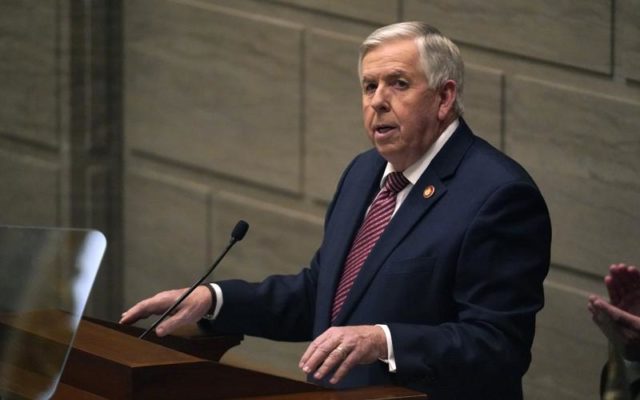THE EGGLESTON REPORT – BILLION DOLLAR TAX CUT

Our state government has too much of your money. At least that is what the House concluded after our work on the budget. Because part of the federal government’s panicked response to the Covid outbreak was to print and flood the economy with billions of extra dollars (which is a prime cause of today’s inflation) and because our economy is now booming, this year’s budget is around $47 billion. This budget, by far the largest in state history, is about $9 billion more than last year and $20 billion more than when I took office eight years ago.
After listening to requests from the departments, investing in some one-time projects, and socking millions away in a rainy day fund, the budget still had $1.8 billion left over. So last week, the House budget chair filed HB3021 to give $1 billion of this surplus back to you, the taxpayer. Unlike the federal government, your state government would not be creating new money, so the move would not worsen inflation. And unlike the liberal ideas of stimulus checks or universal basic income, HB3021 would just give the tax cut to those who paid income tax in the first place.
If passed, it would work like this. Everyone who filed a 2021 income tax return would have some or all of their state income taxes refunded. The total refunded to all Missourians would be capped at $1 billion. The Department of Revenue (DOR) estimates that the maximum returned would be about $375 per person ($750 per couple). During floor debate, some members argued that this would be a tax break for only millionaires, but that is not true. Anyone with an annual income of over $12,550 would get some money back, and anyone making $19,500 or more would likely get the max credit. Under HB3021, citizens would not need to file an amended or special return. DOR would automatically process the credit for each taxpayer.
Given that the state government’s budget has been amply funded at record levels, I support the budget chair’s bill. I have created language mirroring his idea and added it to SB908 to give the effort an additional path to the governor’s desk. It remains to be seen if the Senate will embrace either bill as strongly as the House, but hopefully they will. After all, it was your money that you earned to begin with. You should get some of it back.
As always, if you have any questions about any bill, please email me at [email protected]. Until next time, best wishes of safety, health, and prosperity to you and your family.
PICTURES FROM THE CAPITOL

Grundy County Presiding Commissioner Phillip Ray visits
FROM THE CAPITOL NEWS DESK
House Moves to Protect Missourians from Unapproved Vaccines (HB 1709)
The members of the Missouri House took action this week in an effort to protect Missourians from being forced to take vaccinations that have yet to receive full authorization.
HB 1709 provides it is an unlawful discriminatory practice for any government entity in the state to require any person to receive a medication, vaccination, or injection that has not been fully authorized by the US Food and Drug Administration (FDA), is allowed under an emergency use authorization, or is undergoing safety trials.
The bill’s sponsor, who also works in the health care field, told her colleagues she has personal experience with a workplace mandate to receive the COVID-19 vaccine. She said, “I’ll never forget the day that I received an email, it was actually on my birthday, stating that I had to get the vaccination or else I would lose my job. My issues with that was that it wasn’t fully FDA-approved.” She added, “There’s a lot of people that are scared when you’re told you have to get a vaccination. I am in no way, shape, or form against the COVID vaccination. I did personally receive the vaccination, but I waited until the Pfizer was FDA-approved before I went ahead and got it.”
The sponsor said her experience “really got me thinking about what happens in the future if something like this happens again and we’re forced to have to take a vaccination and it doesn’t make it across the finish line before my deadline.”
HB 1709 specifies that its provisions will not prohibit health facilities from requiring employees to receive a COVID-19 vaccine in order for a health facility to participate in a federal program or contract, and the provisions will not prohibit public colleges or universities from requiring select students to receive a COVID-19 vaccine in order for a college or university to receive federal funds.
The bill now moves to the Senate for consideration.
Parents’ Bill of Rights Heads to Senate (HB 1858)
Legislation is now on its way to the Senate that would create the Parents’ Bill of Rights Act of 2022.
The bill’s sponsor said his legislation is “really about transparency in public education. It’s about recognition of the fact that parents are the ultimate authority when it comes to the direction of the education of their children.”
He added, “This bill is for every parent who might have been ignored at a school board meeting and not listened to, and purposefully relegated to sit in silence as business was done. This is about those who have concerns about the content of the classroom, and classroom materials; what is being put in front of their child in the classroom.”
The bill will provide a list of rights that parents may require school districts to follow. Some of the parental rights outlined in the bill include the right to review curricula, books and instructional materials; the right to visit school during school hours with restrictions; and the right to have sufficient accountability and transparency regarding school boards.
The bill also prohibits school districts from requiring nondisclosure agreements for a parent’s review of curricula or individualized education program meetings. It would restrict schools from collecting biometric data or other sensitive personal information about a minor child without obtaining parental consent. Additionally, it would require school board meetings dealing with curricula or general safety to take place in public and allow for public comments.
Additionally, the bill specifies that no school or school employee can compel a teacher or student to personally adopt or affirm ideas in violation of Title IV or Title VI of the federal Civil Rights Act of 1964. This would include ideas such as individuals of any race, ethnicity, color, or national origin are inherently superior or inferior; or that individuals, by virtue of their race, ethnicity, color, or national origin, bear collective guilt and are inherently responsible for actions committed in the past by other members of the same race, ethnicity, color, or national origin.
The bill also allows parents to file a civil lawsuit against a school district or school that violates the Parents’ Bill of Rights. Other provisions in the bill would require the Department of Elementary and Secondary Education to develop an online database that provides access to every school district’s curriculum and professional development materials; require the salaries of public school employees to be included in the state accountability portal; and require school boards to provide a time for an open forum at the beginning of each board meeting and allows parents to bring civil action against school districts that violate the policy.
“We need to teach kids how to think, not what to think. We need to encourage parent involvement, not discourage it. This is about protecting our kids in schools,” said the bill’s sponsor.
Bills Sent to the Senate
HB 3017 re-appropriates approximately $438 million for ongoing projects around the state that have already been undertaken. Projects range from renovation and improvements of vocational technical schools to new facilities on college campuses to projects at veterans’ homes and cemeteries.
HB 3018 appropriates approximately $477 million for maintenance and repair of statewide facilities.
HB 3019 appropriates approximately $469 million to fund capital improvement projects around the state. The bill includes $65.5 million for National Guard facilities, $22.7 million for various parks and historic sites, $15 million for improvements for various conservation sites and facilities, $10 million for charter school deferred maintenance, and $300 million for the Missouri State Capitol Commission Capitol Preservation Fund.
HB 2152 provides a definition for “school innovation team” and for “school innovation waiver” and allows school innovation teams to submit a plan to the State Board of Education (SBE) for a state innovation waiver for a variety of purposes as outlined in the bill. Supporters say the bill provides an opportunity for schools to innovate without fear of repercussions in the accreditation process. Schools that use these waivers might pilot new programs that will benefit their students and provide additional flexibility to explore opportunities in education that will address student’s needs.
HB 2625 allows certain individuals holding a valid current professional license in another state or territory of the United States to practice such profession in Missouri, without obtaining a Missouri license, as part of a partnership with the federal Innovative Readiness Training program within the United States Department of Defense. Such individuals must be active duty or reserve members of the Armed Forces of the United States, members of the National Guard, civilian employees of the United States Department of Defense, or professionals otherwise authorized by the United States Department of Defense and their practice of the profession in Missouri must be required by the federal Innovative Readiness Training program under military orders. Supporters say that with a partnership through the US Department of Defense (DOD), the Delta Regional Authority supports the Innovative Readiness Training (IRT) program that would bring medical, dental and vision care to Delta residents in southeast Missouri at no cost. The DOD needs legislation to allow the members of the military to practice in Missouri with their credentialing orders, to provide the health care services in underserved areas.
HB 1696 modifies provisions relating to the illegal discharge of firearms. Currently, a person commits the offense of unlawful use of a weapon if they discharge or shoot a firearm from a motor vehicle. This bill allows the discharge of a firearm from a stationary vehicle as authorized under the Missouri Wildlife Code. The bill also establishes “Blair’s Law” which provides that a person commits the offense of unlawful use of a weapon if, with criminal negligence, they discharges a firearm within or into the limits of any municipality. Supporters say farmers and ranchers need to have the ability to protect their livestock from predatory animals without the fear of being charged with a felony offense. The bill would allow them to do just that. In addition, owners of firearms need to act responsibly with the weapons. Celebratory gunfire can injure or kill innocent people. The bill establishes consequences for celebratory gunfire.
HB 2574 requires scrap metal dealers and others regulated under state law to require proof that the seller of a detached catalytic converter is a bona fide automobile repair shop or sign an affidavit that the converter was lawfully acquired. The make, model, year, and vehicle identification number of the vehicle from which the converter originated will be required and maintained for four years. The bill adds that a person commits the offense of stealing if they retain or dispose of the property of another while they reasonably should have suspected that such property has been stolen. Supporters say catalytic converter theft is a serious problem with the theft of catalytic converters on the rise in the state. These thefts are hurting a number of different businesses related to automobiles. This bill will help in reducing the amount of catalytic converter thefts and fraud.
HB 2566 allows the director of the Department of Commerce and Insurance to issue a limited lines travel insurance producer license to a person or business entity that has filed an application approved by the director. The bill also allows any person who is already licensed in a major line of authority as an insurance producer to sell, offer, negotiate or solicit travel insurance. Supporters say many states are already starting to do this. This is basic insurance, which doesn’t require as much training to sell it.
HB 2493 expands on the criteria for career ladder admission and stage achievement. Additional responsibilities and volunteer efforts outside of compensated hours may include uncompensated coaching, supervising, and organizing extracurricular activities, serving as a mentor or tutor to students, additional teacher training or certification, or assisting students with college or career preparation. The bill increases the state percentage of funding for salary supplements for career ladder from 40% to 60% and lowers the number of years before a teacher is eligible from five to two years. Supporters say the bill rewards teachers for taking extra time working with students, fostering community engagement and professional development of students. It would increase interaction time between parents and teachers filling the gap of learning loss that is being experienced currently. The bill also provides bankruptcy protection for the Missouri Education Savings Program and the Missouri Higher Education Deposit Program also known commonly as 529 education savings accounts.
HB 2365 removes the Department of Health and Senior Services and the Department of Social Services from the program collaboration as their prior role is now combined in the Office of Childhood under the Department of Elementary and Secondary Education. The bill removes the label of pilot program from the early learning quality assurance reporting program and authorizes the program to provide continuous improvement and ongoing updated consumer education. The bill also removes the sunset provision. Supporters say making the learning quality assurance report program permanent will allow parents to continue to be empowered with the tools to make informed decisions about their childrens’ opportunities. The program enables providers to implement best practices and gives them access to resources that will help build high-quality options for families.
HB 2571 grants the Division of Finance (DOF), within the Department of Commerce and Insurance the authority over the laws relating to persons and entities engaged in the following: (1) Banks, trust companies and the banking business. Currently the Division has regulatory authority over these entities. (2) Mortgage loan business; (3) Any other financial-services-related business over which the Division is granted express authority. The bill grants the director discretionary authority to issue bulletins regulating the businesses, which do not have the force or effect of law and are not regarded as statements of general applicability for rule promulgation. Supporters say DOF is being authorized to publish industry guidance letters in a timely fashion, to promote consistency and transparency, to enable the banks to develop their policies and procedures prior to DOF examination in order to achieve compliance. The non-bank consumer lenders will come under the purview of DOF. The bill also establishes the “Missouri Workplace Retirement Savings Plan” and the “Missouri Workplace Retirement Savings Board”. Additionally, the bill creates the “Commercial Financing Disclosure Law”, which provides bankruptcy protection for the Missouri Education Savings Program and the Missouri Higher Education Deposit Program also known commonly as 529 education savings accounts, adds damaging or making a “teller machine” inoperable to the offense of property damage in the first degree, and modifies the statute related to the offense of money laundering.
HB 2325 establishes the “Workforce Diploma Program” to assist students in obtaining a high school diploma and develop employability and career technical skills. Supporters say the bill improves job prospects to enable the students to get higher and better paying jobs. Over 445,000 adults in Missouri don’t have a diploma. Several other states have adopted the program. There is a need to upskill Missourians and this program will help train the workforce. The bill also establishes the “Extended Learning Opportunities Act” and allows synchronous instruction connecting students to a live classroom in a Missouri adult high school to be treated the same as in-person learning.
HB 2090 allows the salaries of state employees to be paid in biweekly installments, as designated by the Commissioner of the Office of Administration. Supporters say receiving a salary once a month is a burden for the state employees and many of the state employees have to work part-time jobs to supplement their income. The bill addresses the shortfall by paying the employees a biweekly salary thereby eliminating the need for the employee to make choices.
HB 1683 requires public institutions of higher learning to adopt and implement policies, as outlined in the bill, that will give undergraduate course credit to entering freshman students for each advanced placement (AP) examination upon which such student achieves a score of three or higher. Supporters say there are several bordering states that have a policy for acceptance of AP scores 3 and above and this attracts Missouri students to those universities. This would provide assurance to students taking these very difficult exams that they would receive university credit.



